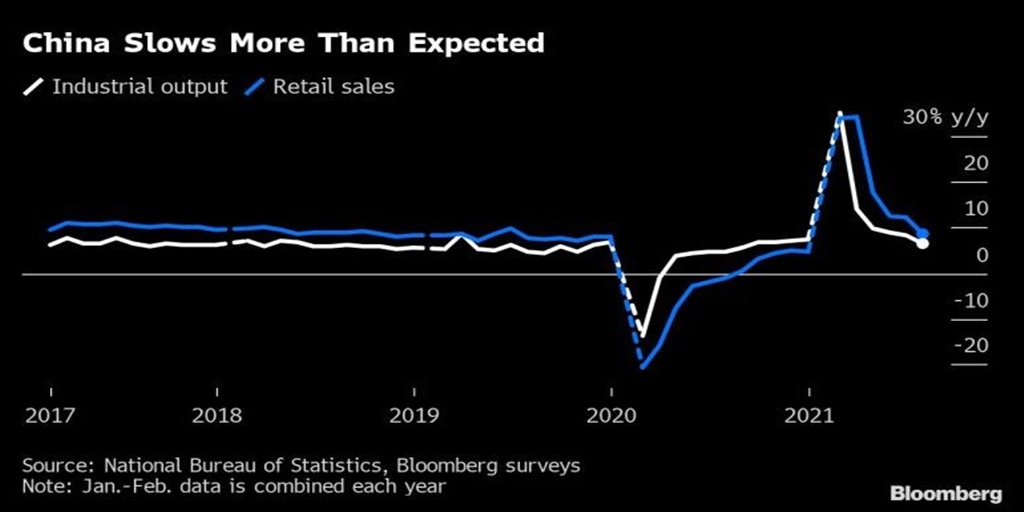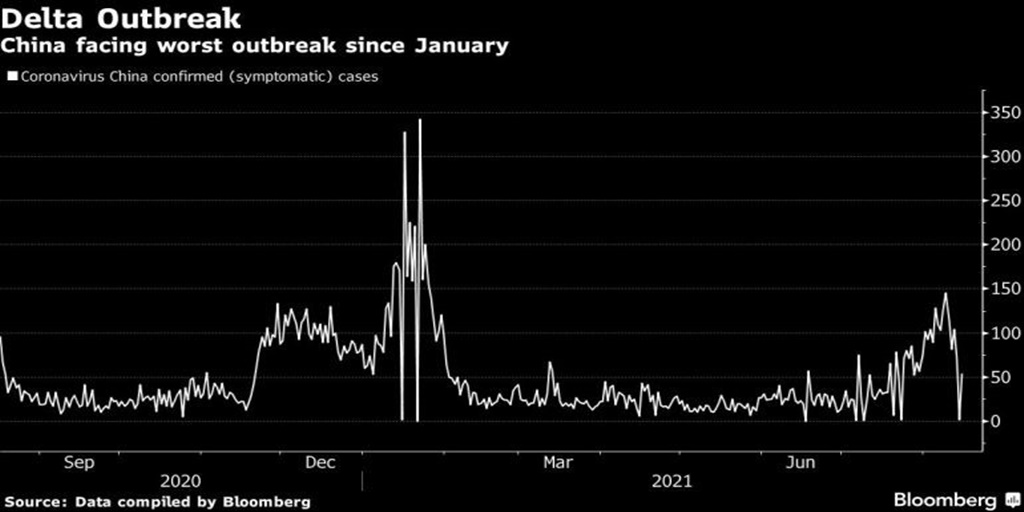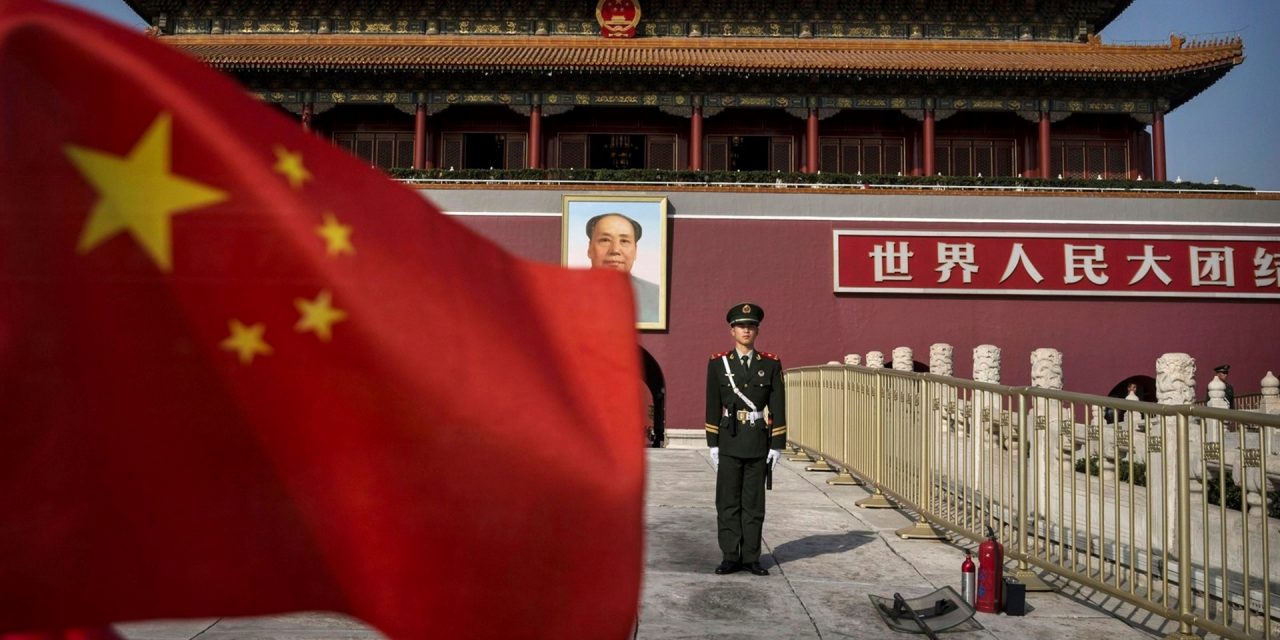China’s data underlined the potential havoc the highly contagious Delta variant of the coronavirus could have on the global economic recovery.
China’s economy slowed more than expected in July, adding to signs that the global recovery is coming under pressure as the delta virus variant snarls supply chains and undermines consumer confidence.
Retail sales were hit by tough new virus restrictions introduced toward the end of the month to contain fresh outbreaks. Flooding in central China and weak auto sales due to a chip shortage hurt manufacturing, while a slowing property market and environmental policies reduced output of steel and cement, hitting commodity demand.
Alongside a slump in U.S. consumer confidence to an almost decade low and increasing supply chain pressures in southeast Asia, China’s data underlined the potential havoc the more contagious delta virus variant could have on the global recovery. A key container port in China was partially shut last week after a worker was infected there, disrupting trade at a time when businesses are ramping up for the Christmas holiday shopping season.
“If China’s economic growth loses steam amid Covid-19 resurgence, the rest of the world could see further headwinds to growth momentum, from supply chain disruption to slower-than-expected normalized consumption,” said Bruce Pang, head of macro and strategy research at China Renaissance Securities Hong Kong.
China’s slowdown also means weaker demand for global commodities. Oil prices sank for a third consecutive day, with West Texas Intermediate slumping 2%. Copper futures in Shanghai closed down 0.4%, reversing an earlier 1.3 percent gain.


Key highlights from China’s July activity data:
- Retail sales rose 8.5 percent y/y vs median estimate of 10.9 percent
- Industrial production increased 6.4 percent y/y vs median estimate of 7.9 percent
- Fixed assets investment climbed 10.3 percent y/y in Jan-July vs median estimate of 11.3 percent
- Unemployment rate rose to 5.1 percent from 5 percent in June
- Using a two-year average growth to strip out the base effects caused by the pandemic, the data showed a notable slowdown in retail sales to 3.6 percent in July. Industrial production was less affected by the consumer slowdown due to strong exports, growing 5.6 percent by the two-year measure, down nearly one percentage point from the previous month. Growth in fixed asset investment was roughly stable.
“July’s data suggest the economy is losing steam very fast,” said Raymond Yeung, chief economist for Greater China at Australia and New Zealand Banking Group, which downgraded its full-year growth forecast to 8.3 percent. “The resurgence of delta also adds extra risk to August’s activities.”
China’s outlook now depends on whether the Covid restrictions can be relaxed this month, and if Beijing will increase monetary and fiscal stimulus to prevent a sharper slowdown. The People’s Bank of China signaled a steady policy course on Monday, keeping its key interest rate unchanged while rolling over most of the policy loans coming due.
China’s benchmark 10-year bond yield rose one basis point to 2.89 percent. The CSI 300 stock index rose as much as 0.6 percent before paring gains later in the day.
What Bloomberg Economics Says…
The broad-based undershoot in China’s July activity does not mean the recovery is derailing. The weakness was centered in consumption, reflecting the blow from the delta variant outbreak. The impact on demand is likely to be even greater in August, even with signs that infections may be starting to peak. But the sudden loss of speed in production could be temporary. -Chang Shu and Eric Zhu
An imported case of the delta variant began to spread from the eastern city of Nanjing in July, causing authorities to close tourist sites, cancel cultural events and flights during the summer vacation period to contain outbreaks. Despite vaccinating more than half of its population, China’s ongoing tough Covid elimination policy is hitting consumption: spending in restaurants fell more than 4% in July from the previous month.
The government’s aggressive Covid strategy could prove economically costly. Financial institutions like Nomura Holdings Inc., Goldman Sachs Group Inc. and JPMorgan Chase & Co. have already cut their growth projections for the third quarter and full year. Even with those revisions, Beijing will be on course to meet its relatively modest full-year growth target of above 6 percent.
Industrial Slowdown
The production figures also reflect the impact of Beijing’s tightening regulations to curb pollution and property market risks. Steel production plunged in July to a 15-month low, according to Bloomberg calculations, as the industry begins to make good on a pledge to reduce output below last year’s record levels to restrain emissions.
Cement production fell for a third consecutive month, suggesting property and infrastructure investment, which helped power China’s rapid pandemic recovery, will both remain subdued this year.
Factories faced other constraints in July, including disruptions from floods in the province of Henan, and a continued shortage of computer chips which caused a fourth consecutive month of falling car production.
**Article was first posted on Bloomberg










